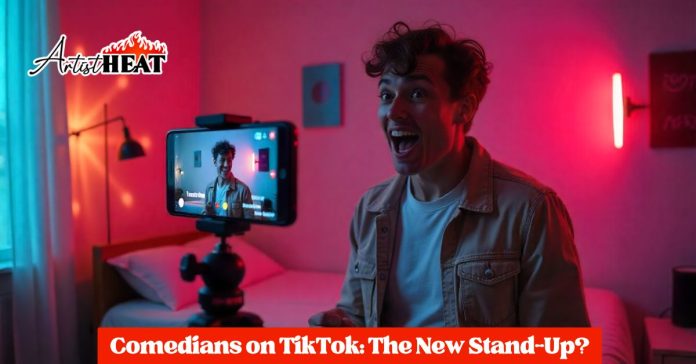The comedy landscape has undergone a seismic shift, and honestly, I’m here for it. While traditional stand-up venues were shutting down during the pandemic, comedians on TikTok were busy revolutionizing how we consume humor. What was beginning of 15-sections videos has turned into a first-hand establishment which is transforming the whole field of comedy across the board.
There are no longer times when you had to be a Netflix special or get booked in a comedy club to reach millions. All that is required now is a phone, some decent lighting and you need to know how to make people laugh within a minute. However, is this digital revolution sucking the life out of the traditional stand-up comedy or are they producing something whole new?
The TikTok Comedy Revolution
Let’s be real – comedians on TikTok have cracked the code that traditional media has been struggling with for years. They have got the idea of how to come up with the punchline quicker than your mind can lose interest, and believe me that in 2025 is quite remarkable.
The platform has resulted as a birthplace of rather comedic talent that may never have been able to find their voice in a privileged institution. Consider creators such as Kallmekris who have risen to have more than 50 million followers after posting random skits. Or take the example of the well-established comics such as Sarah Cooper who took the platform to rejuvenate their careers at a time when they could not perform live.
What makes comedians on TikTok so compelling is their ability to tap into current events, trending sounds, and cultural moments in real-time. Whereas traditional stand-up comedians may take months to perfect a 20-minute show, TikTok artists are hitting the right notes based on yesterday pieces of news with well-timed comedy bits.
The Algorithm as Comedy Club Booker
Here’s where things get interesting – and slightly terrifying. The TikTok algorithm has essentially become the world’s most powerful comedy club booker, deciding which comedians on TikTok get seen by millions and which ones remain in digital obscurity.
Whereas starting to make a pedestrian comedy and growing the audience show by show is the way in old school comedy, now you have TikTok. On TikTok, one can become viral in just one night. The algorithm does not give a crap how many years you spent toiling the funky comedy clubs or whether your father-in-law happens to be one of the industry powerhouses. It is not too familiar with the engagement rates, the watch time and does not care whether people are sharing your material or not.
The democratization of the distribution of comedies has opened a way to previously undiscovered voices that would not have reached the more established gatekeepers. It would seem we are finally getting more varied comedians making it through the ranks, bringing voices and issues that were traditionally marginalized within the mainstream comedy word.
The Art of Micro-Comedy
Creating comedy content for TikTok requires a completely different skill set than traditional stand-up. Comedians on TikTok have mastered the art of micro-comedy – delivering complete comedic experiences in formats shorter than most TV commercial breaks.
It has dictated that the people creating have had to be ever so efficient in their story telling in this compressed format. Each second is precious, each movement is significant, and the structure of setup-punchline has been reinvented to be as effective as possible. Others are now masters of the scroll-stopper; that magical moment at the beginning that persuades viewers to stop their infinite scrolling.
It is not enough to make people laugh, but to make them laugh on time and not to swipe to another video. This has produced some truly radical ideas of timing and structure with comedy.
Traditional Stand-Up Fights Back
Before we write the obituary for traditional stand-up, let’s acknowledge that many established comedians have successfully bridged both worlds. Comedians on TikTok like Drew Lynch and Preacher Lawson have used the platform to build massive online followings that translate into sold-out live shows.
It is not that the TikTok comedy and traditional stand-up are enemies. Several content makers also call TikTok its testing platform, testing how the audience responds to a certain piece before including the proven parts into the performances done in real life. The equivalent is the access to millions of free-of-charge focus groups.
Nonetheless, there is certainly a strain in the comedy world. Other classical comedians say that TikTok comedy is not as rich or detailed as traditional stand-up. They fear that people are losing the art of creating and maintaining comedy tension in longer sequences.
The Economics of Digital Comedy
Let’s talk money, because that’s ultimately what will determine the future of comedy. Comedians on TikTok can monetize their content through various streams: brand partnerships, merchandise sales, live streaming gifts, and driving traffic to other platforms.
Even side by side, the potential earning of successful TikToked comedians can actually be more than those of traditional stand-up comedians (and most especially, those, who are still on the ladder). One viral TikTok video has the potential to earn more money in a week than months of play in tiny establishments.
This economic turn is bringing in talent that could have ventured into the conventional ways of entertainment. Instead of spending years doing comedy gigs in front of tens of people in clubs, why not make some money out of something potentially larger, TikTok?
The Future of Comedy Performance
As we look toward the future, the lines between digital and traditional comedy continue to blur. Comedians on TikTok are increasingly being recruited for television shows, movie roles, and major brand campaigns. The site has been a valid stepping stone to wider entertainment pursuits.
We are also moving towards hybridization hybrid formats i.e. where we have live comedy shows that do something like Tik Tok in very short-form shows live and in Tik Tok creators experimenting with longer-form other platforms. Comedians who are able to master both formats are probably the future.
The question isn’t whether comedians on TikTok represent the new stand-up, but rather how traditional stand-up will evolve to remain relevant in an increasingly digital entertainment landscape. What could be the most humorous is that both the forms not only survive but come to make each other stronger.
The comedy landscape is evolving at an even quicker rate than a TikTok challenge, and on that I am actually excited in where we end up. Be you a fan of 30-second comedy doses or a 30-minute doses, there is no doubt that never, in the history of comedy, it has been a better time to be funny, or to be a fan seeking to laugh.

